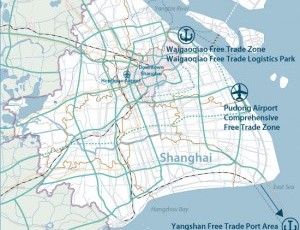Shanghai FTZ Revised Negative List Introduces Targeted FDI Reforms
 By Matthew Zito, Camille Chen and Rainy Yao
By Matthew Zito, Camille Chen and Rainy Yao
SHANGHAI — In the days since the much-anticipated release of revisions to the “Negative List” governing foreign investment into the Shanghai Free Trade Zone (FTZ), analysts have responded with mixed enthusiasm, mostly based on the specificity of the Revised List’s newly opened industries. However, a thorough analysis of these changes, as conducted by Dezan Shira & Associates, reveals greater cause for celebration as the Shanghai FTZ spearheads China’s next chapter of economic reform.
The Negative List is an innovative approach to foreign investment adopted exclusively in the Shanghai FTZ. Under this system, foreign investors enjoy equal treatment as Chinese domestic enterprises in any industry not explicitly restricted or prohibited on the List. As such, it is the cornerstone of the FTZ’s broader package of economic reforms, including streamlined corporate establishment, discretionary foreign currency exchange and advanced dispute resolution.
Overall, the revised Negative List reduces the number of industries restricted for foreign investment by 27 percent to 139 from a previous total of 190. The majority of these changes are concentrated in the categories of (C) Manufacturing and (G) Transportation, Warehousing, and Postal Services, and to a lesser extent (F) Wholesale & Retail. Additionally, the revised Negative List clarifies many of the restrictions stipulated by the original Negative List on investment in specific industries, for example, mandatory Sino-foreign investment ratios.
In terms of manufacturing, foreign investment is now freely permitted for printing inks, pigments and similar products; certain previously restricted chemicals and vitamins; synthetic fibers; construction cranes; and electronic automobile components. While in transportation, the following industries were either wholly or partially liberalized by the revised Negative List: railway freight; international maritime transportation; cargo and container handling; and aircraft repairs.
The financial industry received a strong boost in the revisions, with foreign investment now freely permitted into investment banks, financial companies, trust companies, and currency brokerage companies. Certain terms governing investment into China’s booming healthcare industry were also revised, including abolition of the RMB 20 million minimum investment and maximum operation period of 20 years for medical institutions.
As an indication of China’s commitment to reform in the FTZ, the sensitive cybercafé industry was liberalized by the new Negative List. This appears to align with a larger trend of relaxed restrictions on the entertainment industry in the FTZ where previously China’s twelve-year ban on video game consoles was lifted.
Investors from Hong Kong and Macau were granted several preferential policies by the revised Negative List including freer investment into the construction and operation of movie theaters, as well as a wide range of aviation transport ground-based services. This opens the possibility of foreign investment channeled through Hong Kong into these industries.
For a comprehensive list of all newly liberalized industries or a consultation on what the Shanghai Free Trade Zone can do for your business, please contact Dezan Shira & Associates’ Shanghai office.
Asia Briefing Ltd. is a subsidiary of Dezan Shira & Associates. Dezan Shira is a specialist foreign direct investment practice, providing corporate establishment, business advisory, tax advisory and compliance, accounting, payroll, due diligence and financial review services to multinationals investing in China, Hong Kong, India, Vietnam, Singapore and the rest of ASEAN. For further information, please email china@dezshira.com or visit www.dezshira.com.
Stay up to date with the latest business and investment trends in Asia by subscribing to our complimentary update service featuring news, commentary and regulatory insight.
Related Reading
 Guide to the Shanghai Free Trade Zone
Guide to the Shanghai Free Trade Zone
In this issue of China Briefing, we introduce the simplified company establishment procedure unique to the zone and the loosening of capital requirements to be applied nation wide this March. Further, we cover the requirements for setting up a business in the medical, e-commerce, value-added telecommunications, shipping, and banking & finance industries in the zone. We hope this will help you better gauge opportunities in the zone for your particular business.
 Adapting Your China WFOE to Service China’s Consumers
Adapting Your China WFOE to Service China’s Consumers
In this issue of China Briefing Magazine, we look at the challenges posed to manufacturers amidst China’s rising labor costs and stricter environmental regulations. Manufacturing WFOEs in China should adapt by expanding their business scope to include distribution and determine suitable supply chain solutions. In this regard, we will take a look at the opportunities in China’s domestic consumer market and forecast the sectors that are set to boom in coming years.
- Previous Article Adapting Your China WFOE to Service China’s Consumers: New Issue of China Briefing Magazine
- Next Article China Regulatory Brief: Revised Negative List for the Shanghai FTZ & IIT Collection in Beijing









